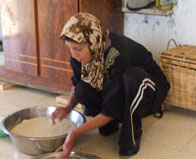 Flour, rain water, salt and sourdough are kneaded in
undulating rhythm at dusk and left to rise in the darkness.
Flour, rain water, salt and sourdough are kneaded in
undulating rhythm at dusk and left to rise in the darkness.
|
 In the morning, the risen dough is formed into
balls.
In the morning, the risen dough is formed into
balls.
|
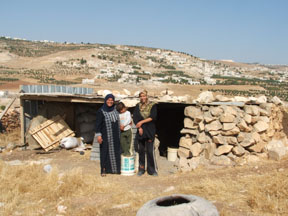 The women bring the dough to the baking house,
a rough stone enclosure with a tin roof.
The women bring the dough to the baking house,
a rough stone enclosure with a tin roof.
|
 Smouldering dung burns all day, keeping the taboun
on the earthen floor warm and ready to receive.
Smouldering dung burns all day, keeping the taboun
on the earthen floor warm and ready to receive.
|
 |
 The dough is pressed flat.
The dough is pressed flat.
|

|

|
 Dough is placed on the heated round rocks in the
taboun.
Dough is placed on the heated round rocks in the
taboun.
|

|
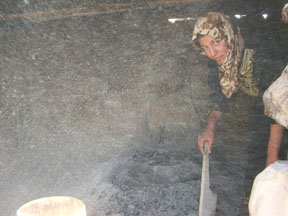 Waiting. Waiting. |
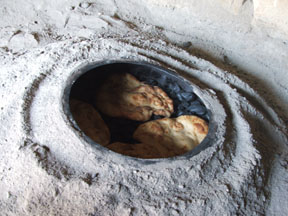 Ready. Ready. |
 Fresh dung is collected in the heap next to the
stove-house
Fresh dung is collected in the heap next to the
stove-house
|

and added under the top layer then covered.
|
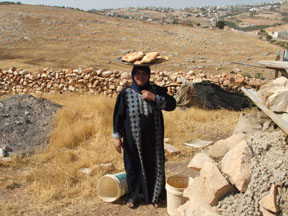 Proud grandmother brings the fragrant, warm bread
to the family for breakfast each morning.
Proud grandmother brings the fragrant, warm bread
to the family for breakfast each morning.
|
 Mohammud, Fatma and their children.
Mohammud, Fatma and their children.
|
Bread Blessing
Bismillah ir-Rahman ir-Rahim
 'Bishmillah' means 'in the name of the source
of life'. 'rahman' and 'rahim ' are from the
Semitic root R-H-M, meaning 'place of utmost tenderness that
gives nourishing protection' - the worb for 'womb' in Hebrew
and Arabic.
'Bishmillah' means 'in the name of the source
of life'. 'rahman' and 'rahim ' are from the
Semitic root R-H-M, meaning 'place of utmost tenderness that
gives nourishing protection' - the worb for 'womb' in Hebrew
and Arabic.
|
Aish - "life"
is an ancient Arabic word for the life processes of
bread The baker blesses the dough with "Bismillah' before
kneading. The family says 'Bismillah' before eating.
An oath of honor is sealed by touching bread. Disregard
of bread is a sign of disrespect toward the Creator. If bread
falls to the ground, it is kissed, saying "Bismillah"
and returned to a clean place. Blessings are conveyed through
bread prepared in a sacred place or offered by a holy person.
Bread eaten together creates a bond of friendship, mutual obligation
and protection.
|
| |
|










 Waiting.
Waiting. Ready.
Ready.








